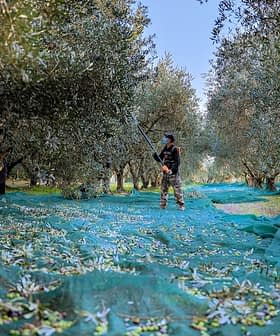Bag-in-Box Containers Prove Superior for Olive Oil Storage
Researchers found bag-in-box containers retained extra virgin quality standards longer than tin-plated steel containers.
 The University of Ioannina.
The University of Ioannina.Extra virgin olive oil packaged in bag-in-box containers retained its quality for longer periods of time and under harsher conditions than extra virgin olive oil stored in tin-plated steel containers, according to a recent study from the University of Ioannina, in Greece.
“Statistical analysis showed that samples packaged both in tin-plated steel and in bag-in-box containers were affected by storage temperature but those stored in bag-in-box containers were less affected,” the researchers wrote in the study.
The main practical implication is that the bag-in-box container provides excellent protection to olive oil from both light and oxygen.
The researchers found that olive oil stored in bag-in-box containers maintained its extra virgin classification for the entire 120 day trial when stored at room temperature (71.6 degrees Fahrenheit) and had a 100 day shelf-life when stored at abuse temperatures (98.6 degrees Fahrenheit).
The olive oil samples stored in the tin-plated steel containers could no longer rank as extra virgin after 80 days of storage at room temperature and only 60 days of storage at abuse temperatures.
See Also:Olive Oil Research News“The main practical implication is that the bag-in-box container provides excellent protection to olive oil from both light and oxygen, as there is no headspace filled with air at any time during its use,” Michael Kontominas, the lead author of the study and a professor at the University of Ioannina, told Olive Oil Times.
“This is better protection than that provided by tin-plated steel and most probably by dark-colored glass, which remains to be proven,” he added.
Kontominas and his research team took four samples of Koroneiki extra virgin olive oil harvested in the exact same manner and placed two samples in the tin-plated steel containers and placed the other two samples in bag-in-box containers. One of each of these samples was stored at 71.6 degrees Fahrenheit and the other of each was stored at 98.6 degrees Fahrenheit.
“Experimental conditions chosen [the oils stored at room temperature] are those similar to supermarket storage conditions,” Kontominas said. “The abuse temperature of 98.6 degrees Fahrenheit was chosen to simulate mostly home temperature conditions encountered during the summer months in the Mediterranean area.”
These abuse temperatures are also frequently experienced by olive oil being transported in non-air conditioned trucks and shipping containers during summer months.
During the experiment, Kontominas and his research team tested several extra virgin olive oil quality parameters every 20 days: free acidity, peroxide value and two absorption coefficients.
The oleic acid content of the oils increased at varying rates over time, with a more rapid increase taking place at higher temperatures and in the tin-plated steel containers. As acidity rises above 0.8 percent, olive oil can no longer be qualified as extra virgin.
The olive oil samples contained in bag-in-box containers did not exceed the 0.8 percent acidity threshold at room temperature over the 120-day test period and only did so in the abuse storage conditions after 100 days. The samples contained in tin-plated steel containers reached the maximum acidity threshold after 100 days at room temperature and 80 days in abuse storage conditions.
Regarding peroxide values, another measure of extra virgin olive oil quality, three of the four samples remained within the parameters necessary to qualify as extra virgin with the exception of the sample stored in tin-plated steel at abuse temperatures.
The same pattern held true when the researchers measured the absorption coefficients of the samples – a measure of how much ultraviolet light the oil can absorb before losing its extra virgin qualification. Only samples stored in tin-plated steel containers at abuse temperatures exceeded the parameters for extra virgin olive oils, which happened after the 60-day mark.
“It is obvious that at abuse temperatures the bag-in-box container proved superior to the tin can as documented by all four olive oil quality parameter values,” the researchers wrote in the study.
“Abuse storage temperatures and the excessive presence of oxygen, as a result of the headspace created in the tin-plated container after each sampling, resulted in a more rapid deterioration of oil quality for the samples stored in tin-plated steel containers as the presence of oxygen enhances oxidation,” they wrote.
Kontominas said that he was not surprised by any of these results. In fact, they confirmed what he had assumed, which was that bag-in-box containers are superior to other ones.
“I expected some kind of a positive effect of the bag-in-box package on olive oil quality retention given the absence of oxygen within the package, something that cannot be avoided in dark-colored glass or tin-plated steel containers with repeated removal of olive oil from the package over time,” he said.
Kontominas and the research team are already in the process of repeating the experiment again with dark-colored glass bottles. Once they have these results, the team will move on to determining the effect of low versus high phenolic olive oil content on product quality retention during storage.








